Smart dogs love a good brain teaser. Some pups have been shown to recall the names of toys even after two years—retrieving them correctly 44% of the time, compared to just a 20% chance guess—according to a study reported by People. Certain dogs don’t just learn; they remember long-term, far beyond the immediate reward.
Mental enrichment isn’t just fun—it’s vital. Tools like interactive puzzle toys aren’t fancy flair—they’re essential cognitive workouts. These toys are “brain games” for dogs, channeling curiosity, reducing boredom (and unwanted behaviors), and keeping them mentally sharp.
When you merge that sharp memory with engaging puzzle play, you’ve got dogs that thrive—it’s not about tricks, it’s about tapping into their natural smarts. That’s why it matters: mental fitness helps them stay confident, balanced, and interested in the world.
Smart dog breeds that like to solve puzzles
Here are some smart dog breeds:
1. Poodle
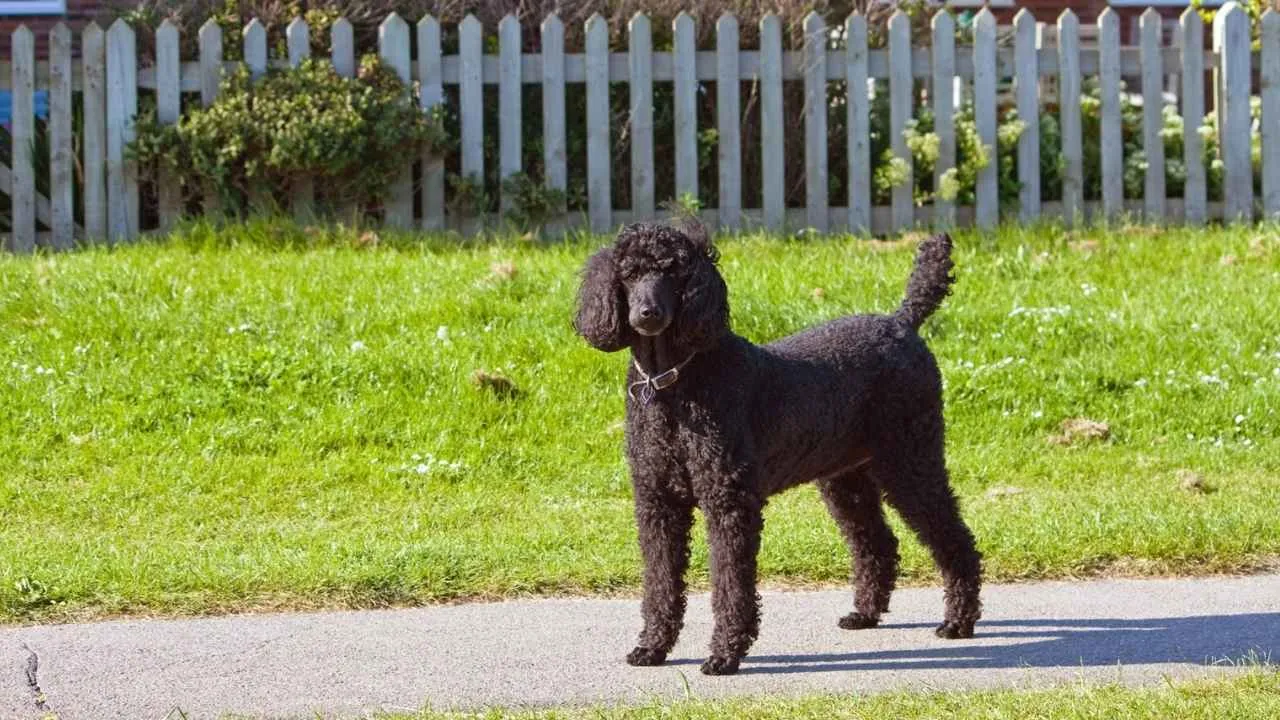
When it comes to intelligent dog breeds, Standard Poodles easily top the list. These dogs aren’t just about fancy haircuts and graceful struts — they’re excellent problem solvers with a knack for figuring out complex tasks faster than you’d expect.
Their sharp minds make them naturals at cracking interactive toys, memorizing routines, and breezing through obedience training. Add in a dash of dramatic flair, and you’ve got a dog that not only learns new tricks but insists you applaud every single one.
Poodles bring a mix of brains, elegance, and energy to the table — perfect for puzzle games and mental challenges.
Poodle Quick Traits
|
Trait |
Description |
|---|---|
|
Intelligence Level |
Exceptionally high – one of the smartest dog breeds |
|
Energy |
Moderate to high; thrives with both physical and mental stimulation |
|
Trainability |
Extremely highly trainable and eager to learn |
|
Coat Type |
Hypoallergenic, curly, requires regular grooming |
|
Notable Skill |
Excels in agility competitions and water sports |
|
Origin |
Originally bred in Germany as a water retriever |
These dogs are quick learners, often outperforming other breeds in dog sports, scent work, and agility. Their versatility is unmatched — one day they’re fetching in the lake, the next they’re mastering a new puzzle toy or performing at a dog show.
Poodles also have a long history as circus performers, thanks to their independent thinking and responsiveness to training. Whether you live in a city apartment or a home with a big backyard, Poodles adapt easily — as long as you keep their minds busy.
2. German Shepherd
German Shepherds don’t just show up — they report for duty. These dogs are built for responsibility, which is why they’re the go-to breed for police work, search and rescue, and even bomb detection.
What sets them apart is their ability to solve problems with precision. Whether it’s disarming a puzzle toy or navigating a complex training scenario, they do it with total focus. No fluff, no distractions — just brains, loyalty, and action.
German Shepherd Quick Traits
|
Trait |
Description |
|---|---|
|
Intelligence Level |
Exceptionally high; masters complex tasks quickly |
Energy |
High – needs both exercise and mental challenges |
|
Trainability |
Extremely obedient; excels in structured environments |
|
Notable Skill |
Superior scent tracking for search and rescue dogs |
|
Personality |
Loyal, protective, and deeply task-focused |
|
Specialty |
First breed used as guide dogs for the blind |
Give them a puzzle feeder, and they’ll approach it with the same intensity they would a detection task. Their strong work ethic and natural canine intelligence make them masters of learning new commands and retaining them long-term.
These working dogs also have deeply rooted herding instincts, which can show up in unexpected ways — like trying to herd family members or other pets. Their protective streak, paired with their laser-sharp thinking, means they’re not just intelligent animals — they’re exceptional companions who take their role seriously.
3. Shetland Sheepdog
Shetland Sheepdogs are bursting with brainpower. These small herders are known for their sharp minds, quick thinking, and constant curiosity. They excel at activities that require independent thinking, and they love puzzles that push their limits.
Whether it’s unlocking a hidden-treat toy or navigating an agility tunnel, Shelties stay laser-focused. Their alertness and responsiveness make them naturals at reading their humans and anticipating routines. This is a breed that stays mentally engaged whether it’s on the move or snuggled up at home.
Sheltie Quick Traits
|
Trait |
Description |
|---|---|
|
Intelligence Level |
Exceptionally high; masters sequences and patterns easily |
|
Energy |
High; thrives with interactive toys and mental play |
|
Problem Solving Style |
Investigative and persistent; treats puzzles like mysteries |
|
Vocality |
Frequent barkers; use voice as a tool for communication |
|
Social Behavior |
Loyal and family-focused, especially with kids |
|
Breed Origin |
Originally bred in the Shetland Islands for herding |
Shelties are puzzle lovers by nature. Their strong background as herding dogs means they’re always observing, calculating, and strategizing. They’re often seen nudging puzzle feeders or circling problem-solving games with focus and intent.
But they do need companionship; behavioral issues like anxiety can arise if left alone too long. With the right balance of attention, challenge, and affection, Shelties shine as one of the most incredibly intelligent small breeds out there.
4. Belgian Malinois
If you’re looking for a dog that thinks fast, moves faster, and never backs down from a challenge, the Belgian Malinois is in a league of its own. These dogs are not casual companions — they’re tactical thinkers with a relentless work ethic.
According to the AKC, when faced with mental challenges, Malinois don’t just participate — they engineer solutions. Their puzzle-solving skills are fueled by focus, memory, and a constant need for stimulation.
Belgian Malinois Quick Traits
|
Trait |
Description |
|---|---|
|
Intelligence Level |
Highly analytical; ranks among the most intelligent breeds |
|
Puzzle-Solving Style |
Methodical, improves with repetition — true canine strategists |
|
Drive |
Extremely high; requires intense activity and problem-solving |
|
Emotional Sensitivity |
Intuitively reacts to owner’s mood; great for therapy dogs |
|
Specialized Roles |
Skilled in search and rescue, detection, and advanced training |
|
Lifespan |
Above average for large breeds; known for longevity |
Their minds are wired for complex tasks, whether that’s sniffing out contraband, skydiving with military units, or zeroing in on an emotional shift in their handler. With their high drive and sensitivity, they demand more than the average obedience session — they crave constant mental workouts.
For experienced handlers, the Malinois offers unmatched capability and loyalty. But for first-time dog owners, this level of canine intelligence can be overwhelming without serious training and structure.
5. Papillon
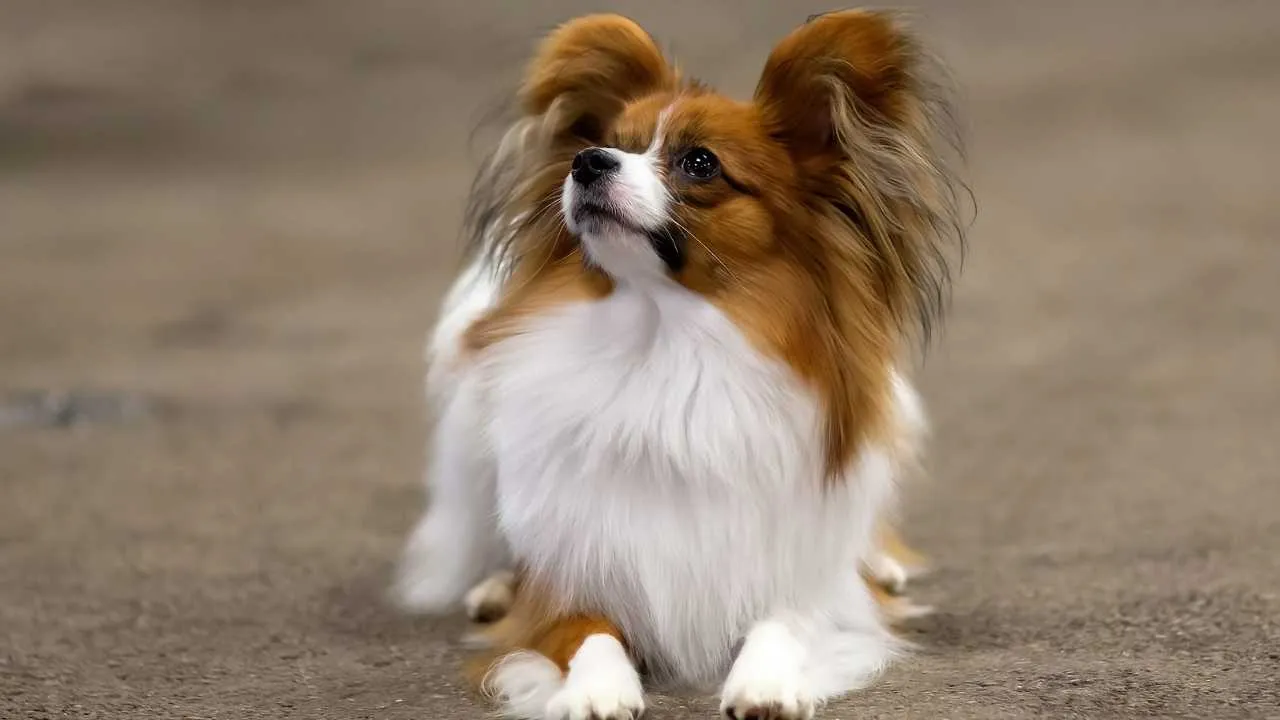
Papillons are proof that big brains can come in small, feathery packages. These tiny dynamos are masters at tackling mental stimulation head-on, thriving on games that test their wit.
Their curiosity never quits — give them a challenge, and they won’t just attempt it; they’ll dissect it with precision. Puzzle toys, obstacle games, scent-based tasks — these dogs are up for anything that keeps their problem-solving skills sharp and their minds busy.
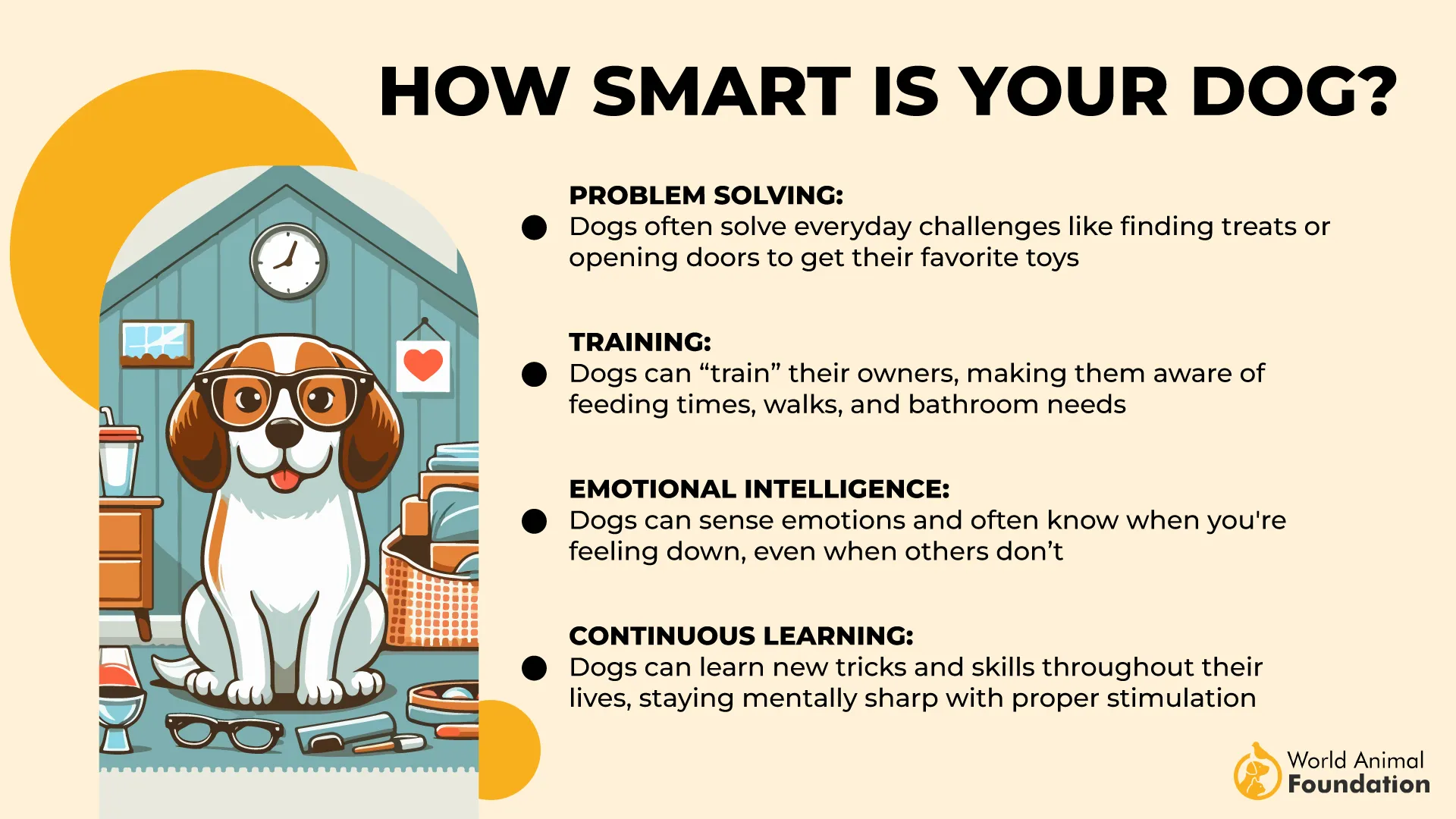
Papillon Quick Traits
|
Trait |
Description |
|---|---|
|
Intelligence Level |
Remarkably high for a toy breed; thrives on mental stimulation |
|
Activity Level |
Energetic and playful; needs both play and interactive toys |
|
Size |
Small and portable, but packed with agility and speed |
|
Problem Solving Style |
Quick and curious; learns from observation |
|
Distinct Feature |
Unique “butterfly” ears give them a standout appearance |
|
Versatility |
Excels in dog shows and advanced obedience competitions |
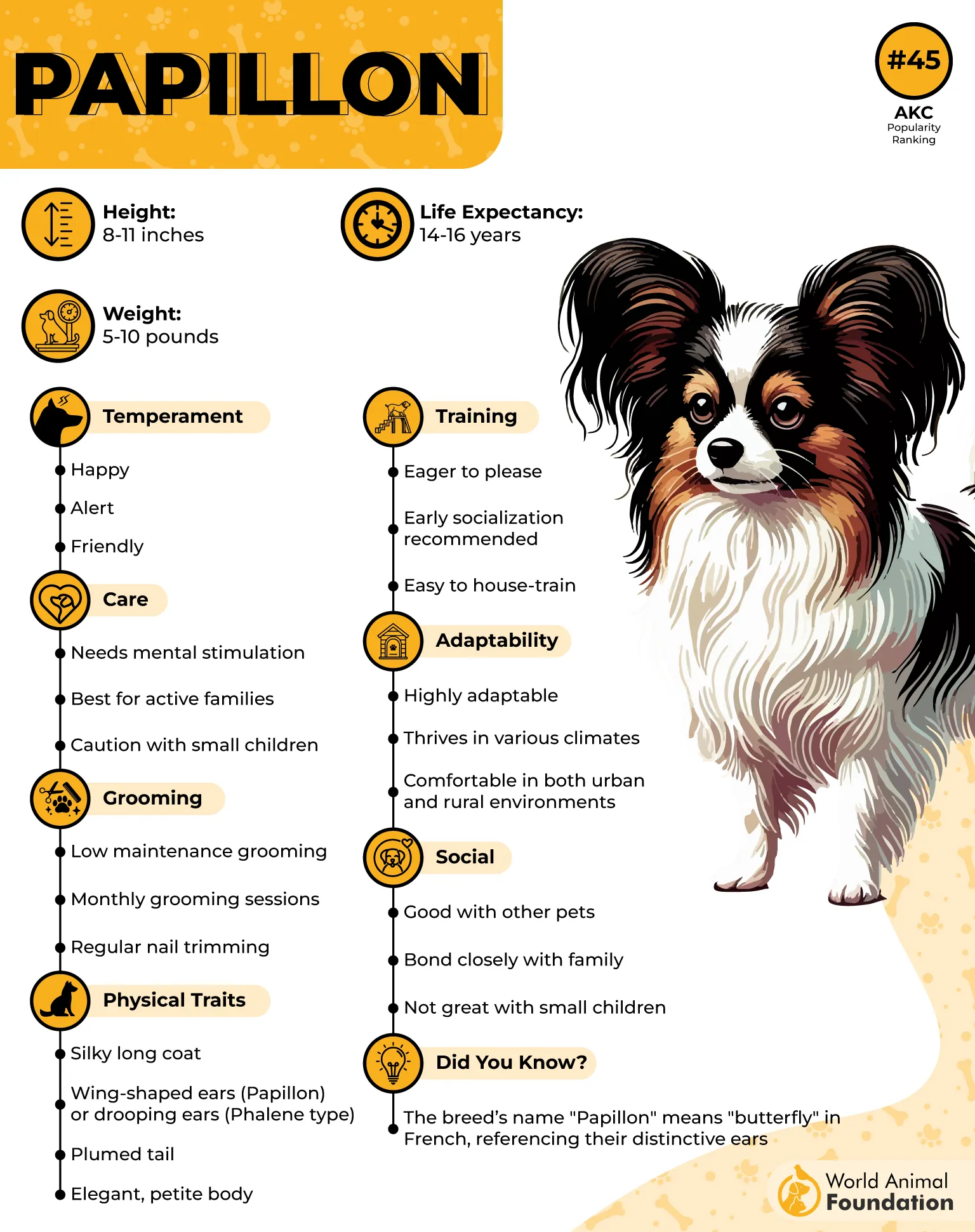
They’re strategic thinkers with the ability to tackle tasks that require fast learners to adapt quickly. These little dogs are also highly attuned to their humans’ mood and respond well to positive reinforcement, making obedience training feel more like a game than a chore.
Papillons aren’t just adorable companions — they’re razor-sharp, fast-moving brains on four legs that keep life entertaining and full of surprises.
6. Golden Retriever
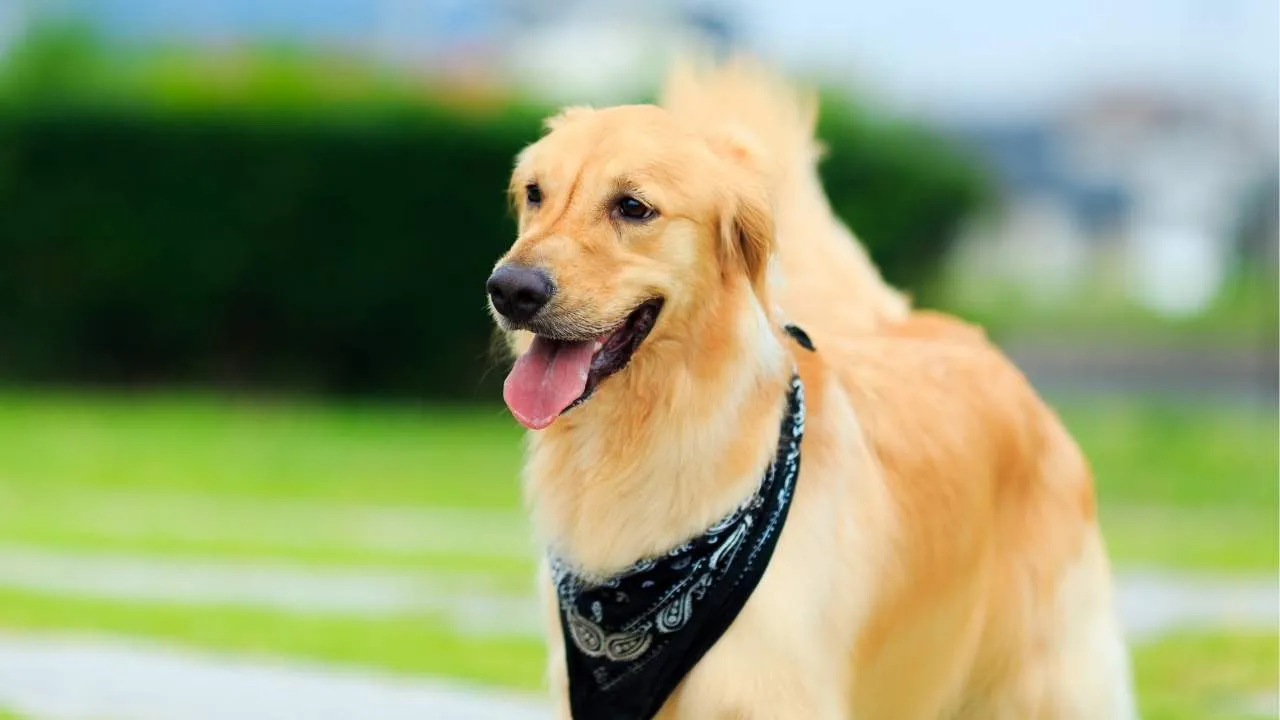
Few dogs blend heart and intellect like the Golden Retriever. Known for their patience, warmth, and steady temperament, these dogs also carry a high level of canine intelligence that often gets overshadowed by their charm.
But make no mistake — Goldens are natural problem solvers. They don’t rush; they assess, strategize, and approach puzzles with quiet focus.

Golden Retriever Quick Traits
|
Trait |
Description |
|---|---|
|
Intelligence Level |
High; excels in tasks involving service dogs and emotional cues |
|
Learning Style |
Steady, thoughtful, and reward-motivated |
|
Key Strength |
Patience and reliability in structured training |
|
Physical Traits |
Water-repellent coat, webbed feet, excellent swimmers |
|
Specialized Roles |
Commonly used as therapy dogs and support animals |
|
Temperament |
Gentle, outgoing, and incredibly loyal |
Their history as versatile hunting dogs, originally developed to retrieve game across land and water, speaks to their adaptability and resilience. They’re also one of the most trusted breeds for roles requiring emotional intelligence — like guiding the visually impaired or calming patients in stressful environments.
In play or work, their problem-solving skills shine through in their measured, deliberate approach. Goldens are not just excellent companions — they’re soulful thinkers with strong instincts and a love for learning.
7. Doberman Pinscher
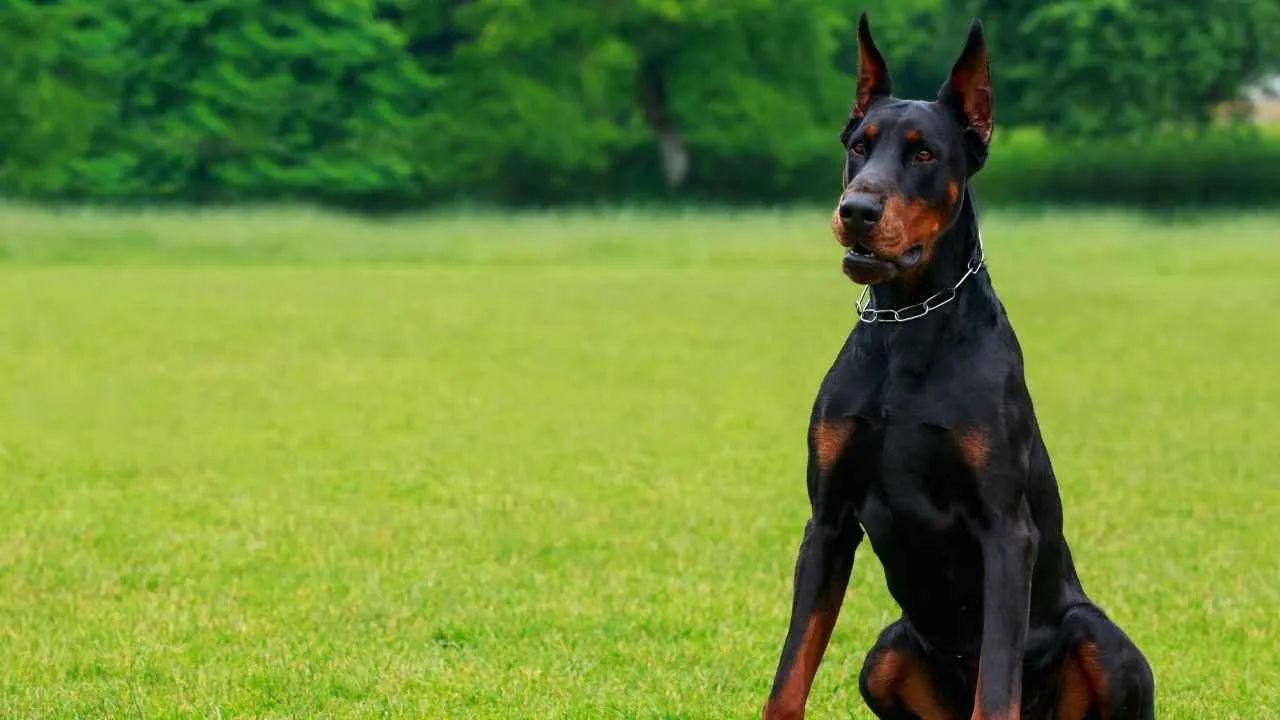
Dobermans are intense, calculating, and fast on the uptake. Behind their sleek, athletic build is a mind wired for working intelligence. These dogs don’t just learn commands — they analyze them, anticipate patterns, and often act before being told.
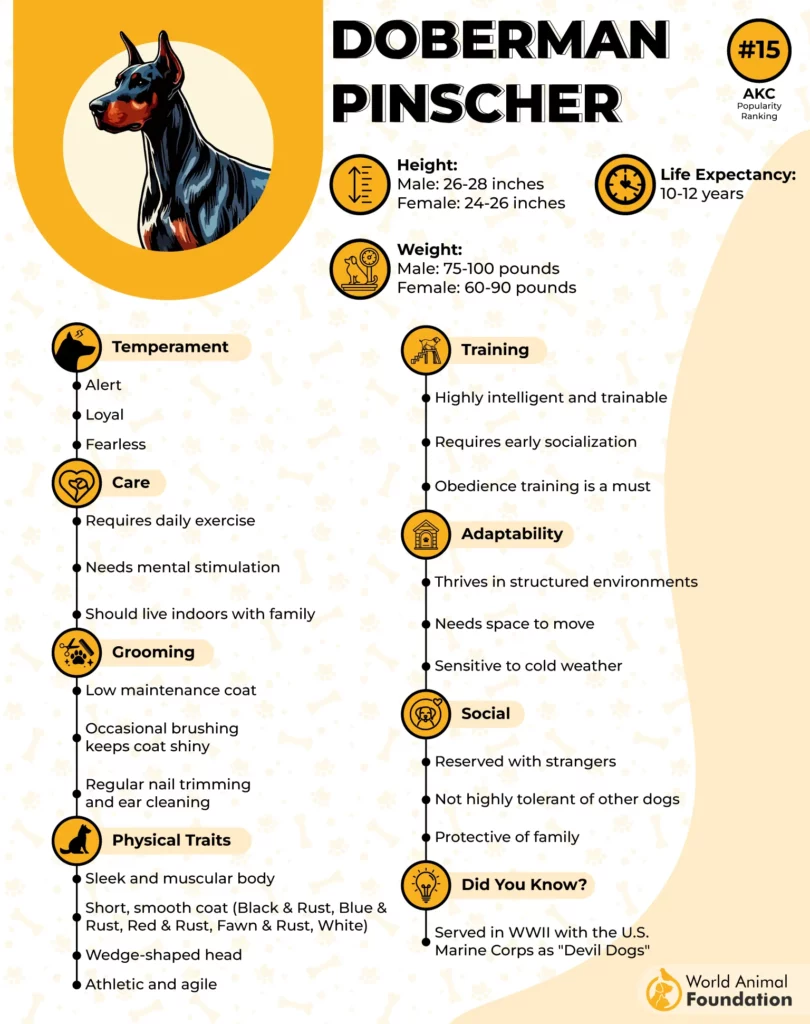
They’re especially responsive to structure, which is why they dominate in obedience training and real-world roles like protection and emergency response.
Doberman Quick Traits
|
Trait |
Description |
|---|---|
|
Intelligence Level |
Very high; excels in obedience training and security roles |
|
Learning Approach |
Predictive: recognizes patterns and adapts quickly |
|
Task Preference |
Enjoys direction and precision work — thrives on routine |
|
Temperament |
Fierce loyalty combined with independent thinking |
|
Special Abilities |
Used in search and rescue, therapy, and detection work |
|
Physical Characteristics |
Powerful build with a unique gait and striking presence |
They were originally bred to protect — and that drive is still central to who they are. But beyond guarding instincts, they have a curiosity that’s hard to satisfy.
These dogs don’t just “play” with puzzle toys — they treat them like codes waiting to be cracked. Their presence is commanding, but at home, they often surprise owners with their affectionate side.
8. Border Collie
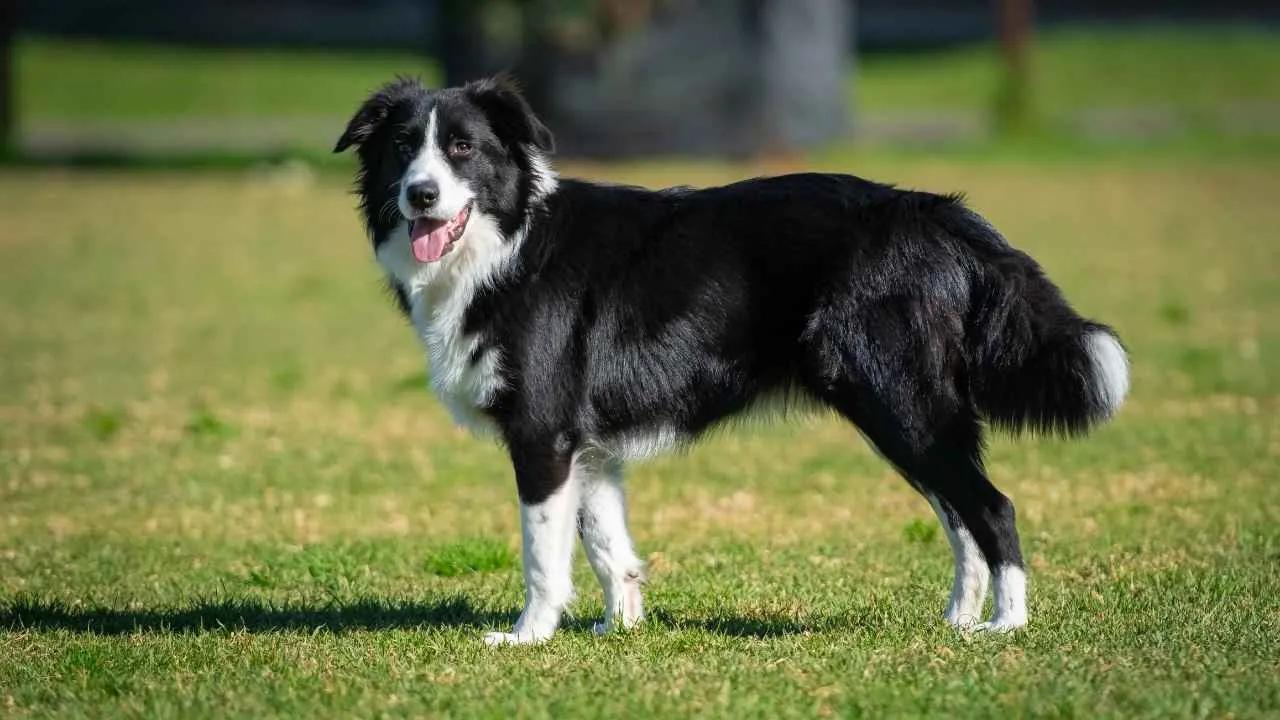
The Border Collie isn’t just smart — it’s strategic. Widely recognized as the smartest dog on the planet, this breed thrives on complexity. They don’t wait to be told what to do; they assess, decide, and act.
Border Collies crave mental games, often outperforming other breeds in complex tasks that involve memory, logic, and spatial reasoning. If left unstimulated, they’ll invent their challenges — and yes, that might involve “reorganizing” the living room. Their intelligence isn’t passive — it’s active, intense, and constant.
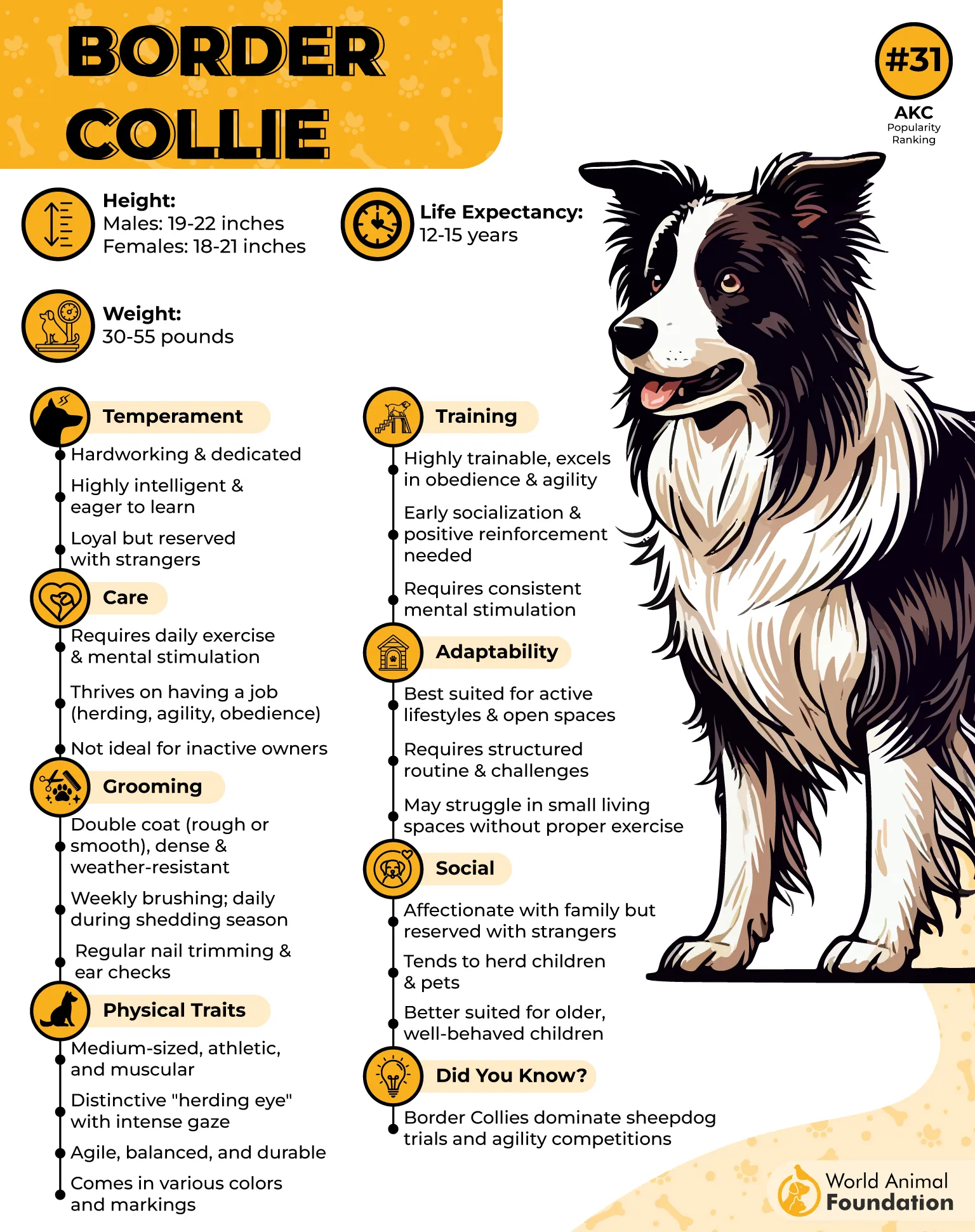
Border Collie Quick Traits
|
Trait |
Description |
|---|---|
|
Intelligence Level |
Top of the scale; often called the smartest dog breed |
|
Thinking Style |
Anticipatory and intuitive; uses logic and pattern recognition |
|
Signature Trait |
Uses “the eye” — a stare used for control during herding |
|
Challenge Preference |
Excels in high-difficulty puzzles and dynamic movement-based games |
|
Natural Abilities |
Strong herding instincts and stamina for long-duration tasks |
|
Behavioral Note |
Known escape artists if left unchallenged or under-exercised |
Their working intelligence allows them to handle tasks with minimal repetition — they often learn new commands after just a few exposures. Give them a goal and they’ll exceed it; ignore their needs and they’ll invent their missions.
With a strong work ethic and unmatched brainpower, they are the elite class of canine thinkers and have a long life expectancy up to 12-15 years.
9. Miniature Schnauzer
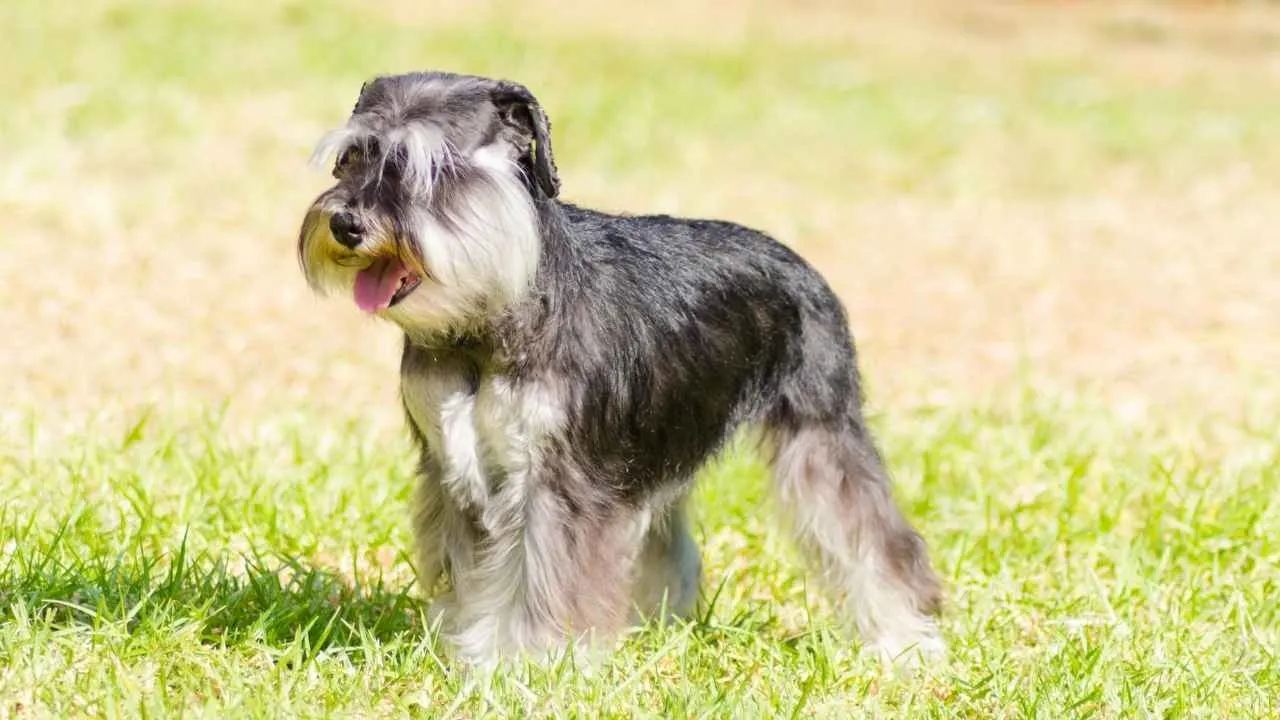
Mini Schnauzers are quick to catch on and eager to engage with anything that challenges their sharp instincts. They thrive on toys, especially those that require multi-step thinking or scent-based navigation.
These dogs were originally bred to hunt vermin, and that persistent curiosity still shows. Give them a puzzle, and they won’t just poke at it — they’ll dissect it with intention. Their lively spirit and natural attentiveness make them ideal for mental stimulation activities that reward both effort and cleverness.
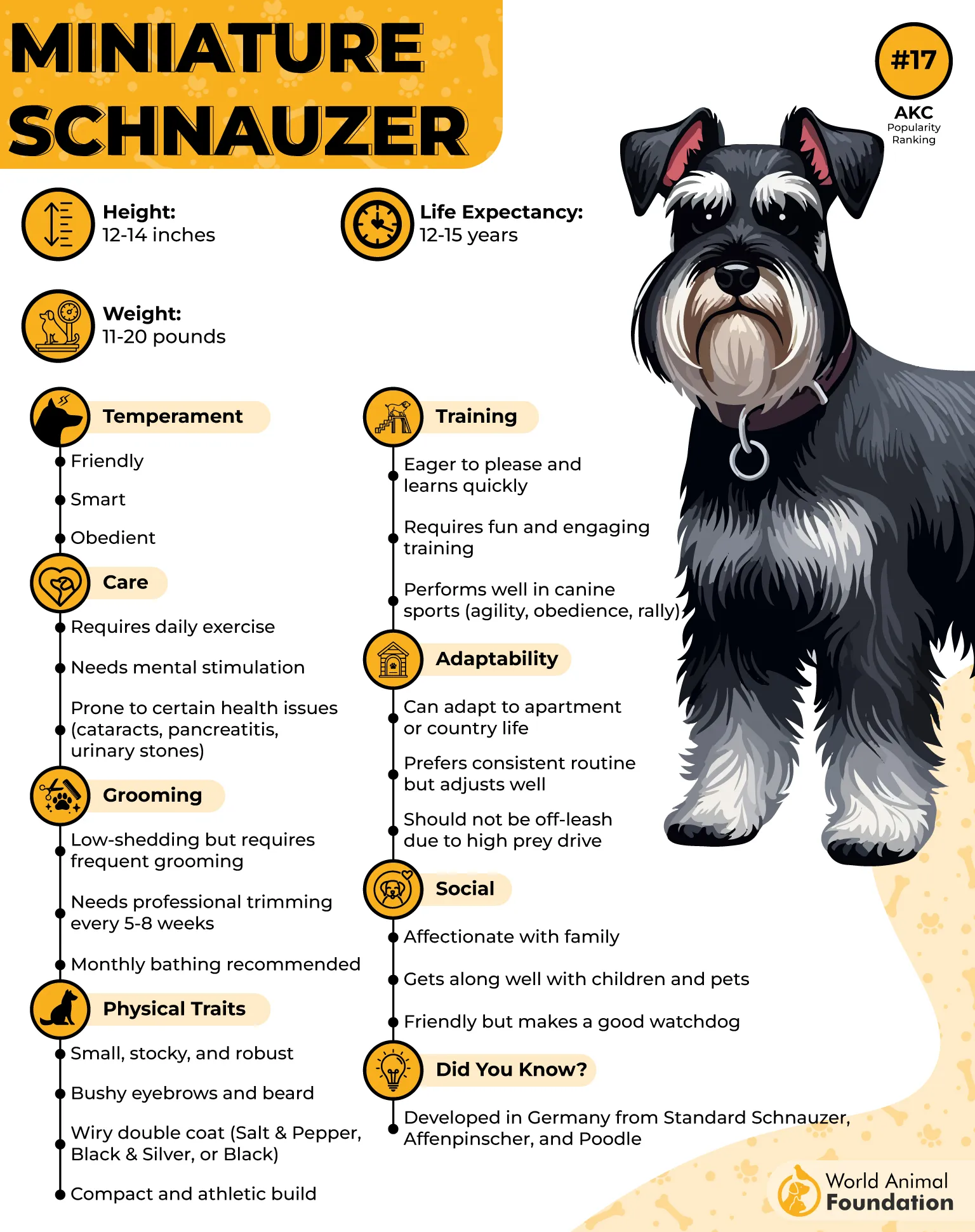
Miniature Schnauzer Quick Traits
|
Trait |
Description |
|---|---|
|
Intelligence Level |
High, nicknamed the “bearded brainiac” for a reason |
|
Learning Approach |
Observational and persistent; solves problems step-by-step |
|
Natural Instinct |
Originally used to track and hunt, now skilled at human-scent detection |
|
Grooming Requirements |
Needs regular care; double coat requires maintenance |
|
Protective Nature |
Watchful and loyal; maintains strong guarding instincts |
|
Shedding Level |
Low; coat sheds minimally, helpful for some allergy sufferers |
These dogs also have a strong sense of routine and location, which makes them excellent companions for people who want a pet that not only listens but anticipates. Though small, Mini Schnauzers are deeply intelligent, emotionally perceptive, and always ready to take on a new challenge — especially if it squeaks or smells like a snack.
Conclusion
Living with a highly intelligent dog means more than a few neat tricks. It means you’re sharing your home with a four-legged mind that craves challenges and thrives on stimulation. These dogs don’t just learn — they adapt, observe, and often outsmart expectations. Whether they were originally bred for herding, hunting, or guarding, today’s smartest pups need outlets for their energy and brains.
If you’re drawn to energetic breeds that love a mental workout, one of these highly trainable dogs could be the perfect fit. Just be ready to stay one step ahead — or at least keep the treat cabinet locked.


